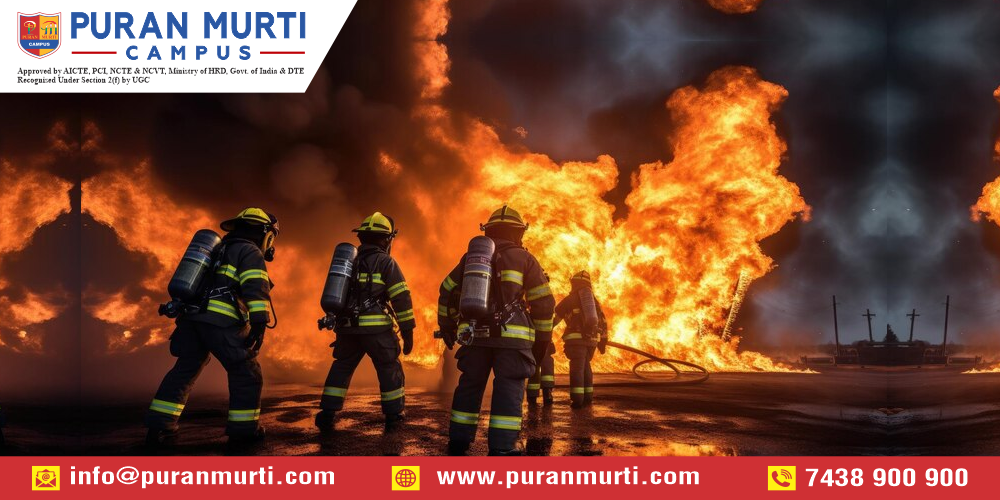“Igniting Careers: The Comprehensive Diploma in Fire Technology and Safety”
Posted on : 4 March, 2024 5:55 pm
Introduction to the Diploma in Fire Technology and Safety
The comprehensive Diploma in Fire Technology and Safety is a specialized program designed to equip individuals with the knowledge and skills necessary to prevent, detect, and respond to fire-related emergencies across diverse industries. This diploma encompasses rigorous training in fire science, engineering principles, and regulatory compliance. Students will learn about fire dynamics, hazard analysis, and the implementation of effective fire protection measures. The program also emphasizes practical training in firefighting techniques, risk assessment, and emergency response protocols, preparing graduates for careers in fire safety management and related fields.
Page Contents
ToggleDuration and structure of the program
The duration and structure of the Diploma in Fire Technology and Safety program in India may vary depending on the institute offering the course. However, a typical overview is as follows:
Duration: The diploma program generally spans over a period of 1 to 3 years, depending on the institute’s curriculum and academic calendar.
Structure:
- Foundation Courses: The program typically starts with foundational courses covering basic principles of fire science, safety regulations, and emergency response procedures.
- Core Courses: These courses delve deeper into specific areas of fire technology and safety, including fire dynamics, fire protection systems, hazardous materials management, and risk assessment.
- Practical Training: Hands-on training sessions and laboratory exercises are integral parts of the program, providing students with real-world experience in fire drills, firefighting techniques, use of fire safety equipment, and conducting risk assessments.
- Elective Courses: Some programs offer elective courses allowing students to specialize in areas such as industrial fire safety, urban fire management, or fire investigation.
- Internship/Industrial Training: Many institutes require students to undergo internships or industrial training programs to gain practical exposure and apply their theoretical knowledge in real-world settings.
- Final Project/Thesis: The program may culminate with a final project or thesis, where students conduct independent research or practical projects related to fire technology and safety under the guidance of faculty members.
Overall, the diploma program in Fire Technology and Safety in India is designed to equip students with the knowledge, skills, and practical experience required to pursue careers in firefighting, fire safety management, and related fields.
Importance of fire safety in various industries
- Human Safety: Fire safety measures are critical for protecting human lives and minimizing injuries in workplaces, residential buildings, and public spaces.
- Property Protection: Fire incidents can cause significant damage to property, equipment, and infrastructure, leading to financial losses and disruptions in business operations.
- Legal Compliance: Adhering to fire safety regulations and standards is essential for ensuring legal compliance and avoiding penalties or liabilities.
- Reputation Management: Maintaining a strong reputation for safety enhances trust among stakeholders and customers, fostering business sustainability and growth.
Importance of fire prevention, detection, and suppression techniques
- Prevention: Effective fire prevention measures, such as proper storage of flammable materials and regular maintenance of electrical systems, reduce the likelihood of fire incidents, minimizing risks to lives and property.
- Detection: Early detection systems, including smoke detectors and heat sensors, enable prompt response to potential fire hazards, allowing for timely evacuation and intervention before the situation escalates.
- Suppression: Implementing efficient fire suppression techniques, such as sprinkler systems and fire extinguishers, helps contain and extinguish fires swiftly, limiting damage and preventing the spread of flames to adjacent areas.
By prioritizing these techniques, organizations ensure comprehensive fire safety strategies that safeguard occupants and assets while minimizing the impact of fire emergencies.
Overview of regulations and standards governing fire safety measures in India:
- National Building Code (NBC): NBC outlines fire safety requirements for construction and occupancy of buildings, setting standards for design, construction, and fire protection systems.
- The Fire Services Act: Governed by state governments, this act empowers fire services to enforce fire safety measures, conduct inspections, and regulate hazardous activities.
- Bureau of Indian Standards (BIS): BIS develops standards for fire safety equipment and systems, ensuring compliance with international norms.
- Occupancy and Fire Load Classification: These regulations classify buildings based on occupancy types and prescribe specific fire safety measures accordingly.
- Electrical Installation Regulations: Governing electrical systems, these regulations include provisions for preventing electrical fires through proper installation and maintenance practices.

